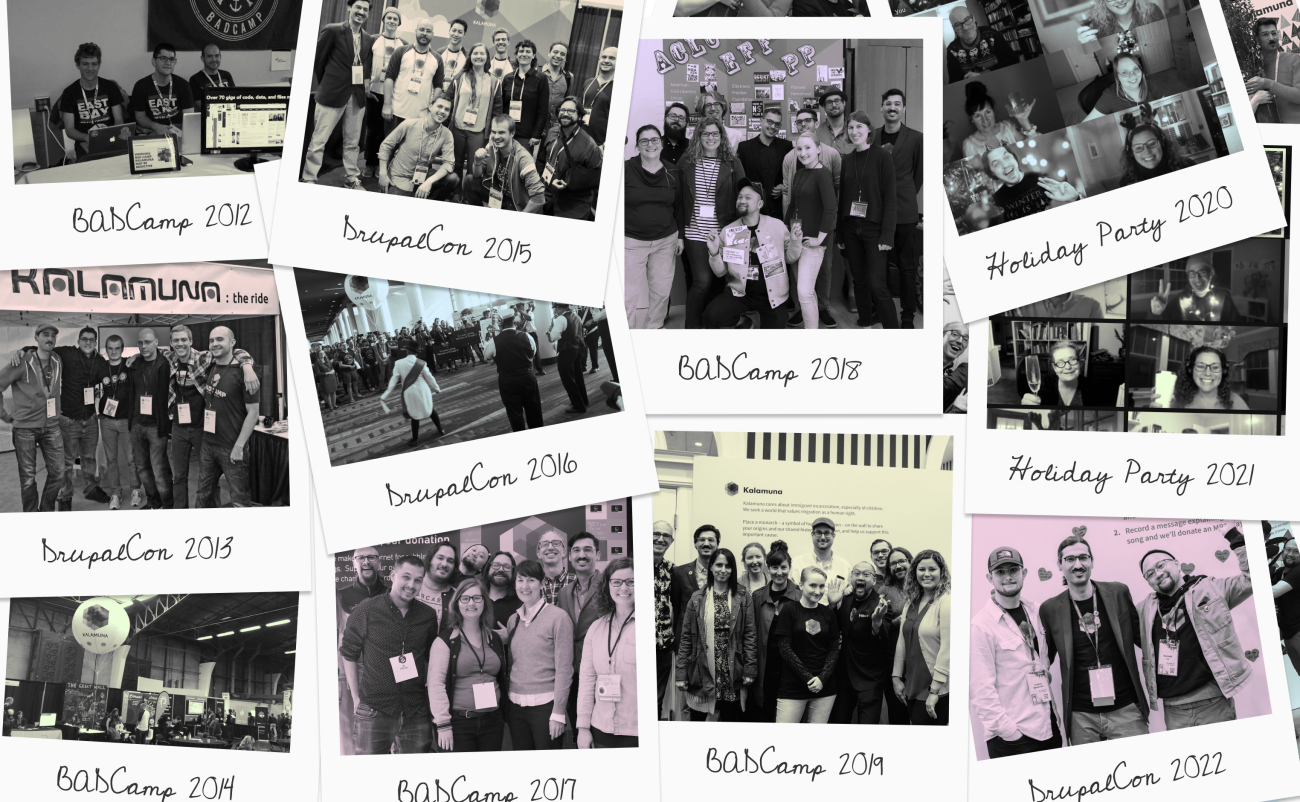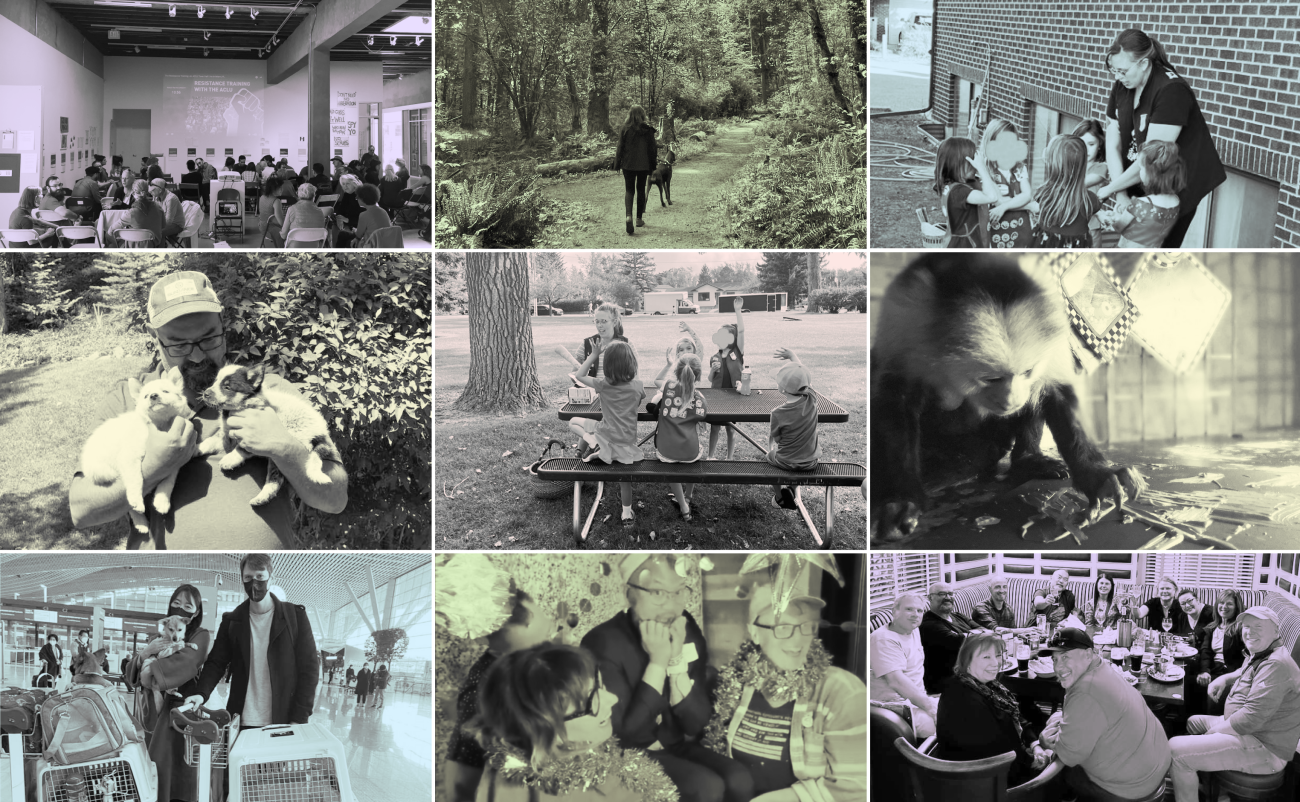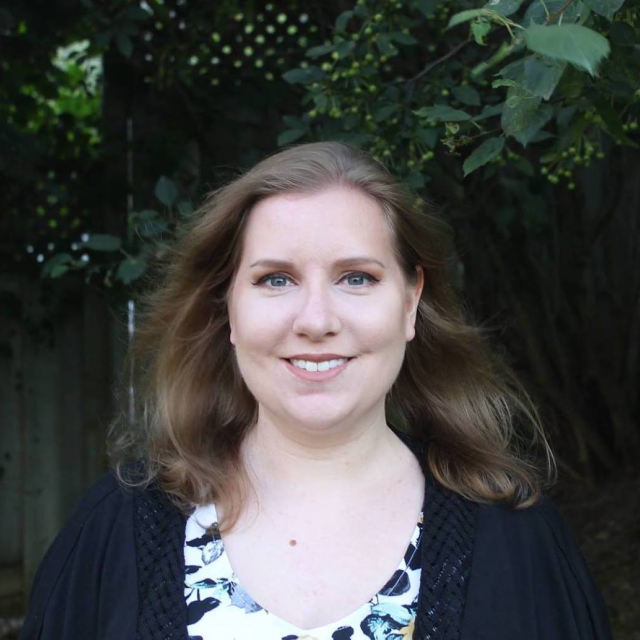
How Do You Turn Your Progressive Values Into a Career? Lessons From a Decade of Working With Mission-Driven Orgs
Share
We’re asking ourselves a lot of questions. It’s the 10-year anniversary of our web design and development agency, Kalamuna, and the milestone invites reflection. One question stands out because all sorts of people seem to struggle with it over their lifetimes: How did we turn our values into a livelihood? It’s a tough nut to crack, so we’re sharing a bit about what’s worked for us.
The experiment called Kalamuna started with a small group of people who were less excited about computer science and web design and more interested in what these disciplines could do for causes they believed in. Our founders and first collaborators were artists, political activists and history buffs—some just out of their first jobs, some more seasoned, but all about to take a years-long crash course in how to work together, grow the agency, and partner with like-minded clients. Some have moved on to other projects, some have remained, and while we’ve undergone several transformations, we’ve maintained our purpose: to use technology to further causes we believe in.
Over the past decade, Kalamuna has solidified its role as a partner to socially impactful organizations such as the Environmental Defense Fund, Stanford University, Greenbiz, Fair Trade USA, and many others taking on the world’s most pressing problems. We empower them with the research, strategy, design, and technology they need to better serve their audiences and communities. Getting here hasn’t been easy.
So how did designers, writers, technologists, and others figure out how to work on causes we believe in? What approaches helped us connect with like-minded people? How did we—as individuals and as a team—make this thing work? To find out, we queried some of our team. Here are some takeaways from our conversations.
Know what you believe—or don't believe
Before you look for or create the work that expresses your values, it might help to know what those values are—or are not. This may seem like a challenge for people who are still discovering what they care about—but signals will likely call out to you during the process, as they did for Kalamuna CEO Andrew Mallis in 2012. Working as a freelancer before he met any of the people who would become Kalamuna’s co-founders, he took part in a Creative Currency hackathon in San Francisco that aimed to reinvision our society’s systems of exchange. He says the experience helped him recognize his own belief that our society can and should solve problems through means other than the market. As he says of the hackathon:
Our team focused on the networked allocation of resources for the homeless, won, and was featured in Forbes. Social Entrepreneurship was all the rage then, but I was deeply unsettled by talk of monetization, business models, and the inherent nobility of markets as solutions to social problems. Having recently returned from New York City to help organize technology infrastructure for the Occupy Wall Street movement, I couldn’t reconcile my politics with this form of capitalism.
The SF social entrepreneurship scene not quite befitting him, Mallis began to make different associations and joined the San Francisco DrupalCon organizing committee, where he met entrepreneur Matt Cheney, who later introduced him to the people who would co–found Kalamuna: Alec Reynolds, Mike Pirog and Andrew Ward. Fast forward ten years: the agency’s changed and grown and those three co-founders have moved on, but Mallis’ belief in non-market approaches to social challenges surfaces in Kalamuna’s unique partnerships—paid and pro-bono—with government agencies, nonprofits, NGOs and other groups structured around a mission.
Over time, staff have joined Kalamuna at various points in their working lives, and it seems that those who can articulate their values are advantaged. They talk about seeing their own passions mirrored in the actions of other individuals, organizations, and larger social movements—and being guided by those visions. Marketing Coordinator Tristan Donowho, who joined Kalamuna in early 2022, talks about making this connection:
Helping people and making others’ lives better is my driving force. I’ve noticed that our communities are more isolated than ever, our stress as a collective has reached an all time high, and people are in need of kindness and aid. This has driven me to work with primarily mission-driven organizations that drive change in the world.
Indeed, by the time Tristan joined our team, we had already solidified relationships with many clients whose missions include creating community and fighting social isolation. These included organizations such as Building Changes, a Seattle nonprofit advancing equitable responses to homelessness, and the Special Olympics of Northern California, which advances the health and community ties of people with intellectual disabilities. In both Andrew and Tristan’s cases, paying attention to what they believed, or were beginning to believe, helped move them closer to an employment situation that aligned with their values.
Find your tribe
Several Kalamuna members report becoming inspired, gaining access to new opportunities, and becoming able to make a greater impact when they’ve joined forces with birds of their feather. As Andrew Mallis says of his freelance days, “Wearing so many hats took a toll, and the size of my clients could not keep up with my ambition. I wasn’t sure what working on bigger projects might feel like, but I did know I needed to find like minded people.” Likewise, several of us have operated as volunteers or solo freelancers for various mission-driven organizations such as Environmental Working Group, SPCA, 100DaysAction, and others, and while these project-based experiences gave us tastes for what values-based collaboration could look like, working with them on ad hoc bases was nothing like finding and committing to a group that just clicks. “Collaborators who are mission-aligned are more willing to engage in a true partnership, which enriches the quality of their participation in the project lifecycle,” says Mallis. Among ourselves at Kalamuna, we’ve traded stories of syncing with like-minded people and feeling more motivated to achieve.
Try things out
“I struggled to find a fulfilling career path for years,” says Kalamuna UX/UI Designer Michelle Balge, who first pursued a business degree at her university. She reports that “learning about how to manipulate people into buying products or services” didn’t motivate her. She switched her major to sociology, which felt more aligned with her interests and values, but she didn’t know what career path it might lead to. A couple of months before finishing her degree, she decided to apply for a certificate program in web design—an activity that she’d considered a hobby until then. “I had a realization at that moment that I could turn my hobby into a career, but I needed it to fulfill my desire to help others in some way and advocate for what’s right in the world.” She joined Kalamuna in 2021, just a few years after her graduation.
Unlike Balge in her younger years, some mid-career folk happy with their careers try new things out for the sake of it, believing that they can always make their livelihoods more fulfilling. Kalamuna Senior UX/UI Designer Jessica Schillinger, for example, designed in-house for nonprofits and public higher education groups for over 12 years. But, she points out that working with one organization and one social issue for a long time can lose its spark:
While I was able to do some amazing work with some great people, [I was] limited in the types of projects and sectors of impact while being in-house. I was looking to start another chapter in my design career, and while I was hesitant to shift to an agency in a business industry (vs. nonprofits), working at Kalamuna gives me the opportunity to expand the types of organizations I can work with and the type of work I’m able to do.
Time and time again, Kalamuna’s people report similar meanderings; a certain class or job didn’t work out, another path sparkled, so they stopped doing that and tried something else.
Will you be proud of the work?
Feeling proud of our work strongly indicates that it aligns with our values. We’ve all forced ourselves—in jobs and other parts of our lives—to do things that we haven’t been particularly excited to do, and those activities have rarely inspired pride. Kalamuna Visual Designer Jayson Bocook puts a fine point on this idea:
I like it when the agency encourages me to think about accessibility and design fidelity as part of our process, rather than not caring about those things and it being a struggle between what I want to do vs. what the agency wants to do. At Kalamuna, those visions are aligned.
Kalamuna has prized accessibility and has implemented many internal processes to increase the accessibility of everything we design and build. We’re happy that our portfolio of work attracts talented designers like Jayson who are proud to make the web more open to all.
Operations Manager Ken Lo bolsters the idea that pride in one’s work indicates an alignment with one’s values. In fact, he met Andrew Mallis through a circle of artists and activists in San Francisco and joined Kalamuna in 2014. Their shared interests have helped create a throughline in their work together. As Ken says:
An organization is only as good as its members. The passion our people bring to making positive contributions on a variety of social-political issues drives the exercise of our collective values into action. It also expands our internal growth and education that generates a mutual attraction between ourselves and value-aligned orgs. What we believe and who we work with shape who we are and what we want to be.
While Ken started as our office manager, his values have driven him to support or lead internal initiatives around DEI, our charity donation booths at conferences, and more.
Over our 10 years, many people have left their mark on our agency. We’re proud to have assembled such smart, caring people to contribute to causes we believe in. We’ve all got different stories about how we’ve turned our values into livelihoods, and we know it’s something many people seek to do. In our reflections about this topic, we’ve learned that understanding our own values is crucial to making sure they’re manifested in our actions. We also agree that connecting with like-minded people is important to validating and amplifying your impact. Experimentation is a big theme, too, with many of us acknowledging that our histories of discovering what we’ve really wanted to do have been full of fits and starts, and some wrong turns.
But it’s our last takeaway that seems, paradoxically, so simple and yet so not obvious: If you feel proud of something you’ve done, chances are that there’s something about it that you deeply value. Putting a name to it may be another challenge entirely.






